Former Japanese Prime Minister Shinzo Abe assassinated at campaign event
Former Japanese Prime Minister Shinzo Abe died on Friday after a man gunned him down with a homemade firearm while he delivered a stump speech in the western city of Nara.
Abe, the nation’s longest-serving prime minister, was just minutes into his address when gunfire broke out around 11:30 a.m. local time. He was campaigning at the time for Sunday’s elections for the parliament’s upper house.
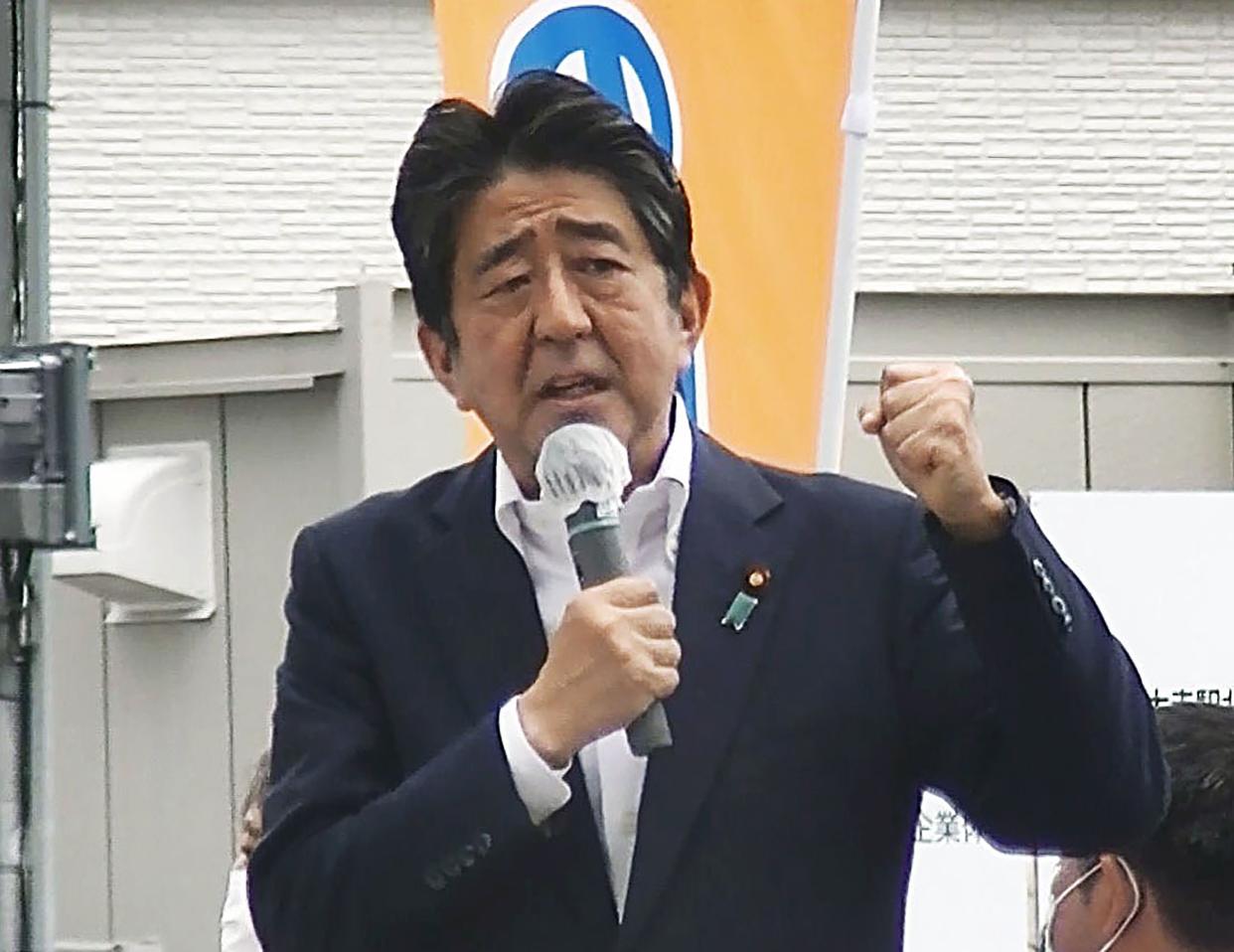
Japan’s former Prime Minister Shinzo Abe makes a campaign speech in Nara, western Japan shortly before he was shot Friday, July 8, 2022.
Local fire department official Makoto Morimoto said Abe was in cardio and pulmonary arrest after being shot, but that his heart stopped while he was being airlifted to Nara Medical University. The ex-prime minister sustained two gunshot wounds — one in the neck and another in the heart — and was later pronounced dead despite emergency treatment that included massive blood transfusions, according to hospital officials.
Doctors said the bullet that killed the former Japanese leader was “deep enough to reach his heart” and that they were ultimately unable to stop the bleeding. Abe was 67 years old.
Tetsuya Yamagami — an unemployed 41-year-old, who previously served in the Navy — was taken into custody at the scene of the shooting. He allegedly confessed to the attack, which has left citizens across Japan — a nation with strict gun laws where such violence is incredibly rare — in total shock.
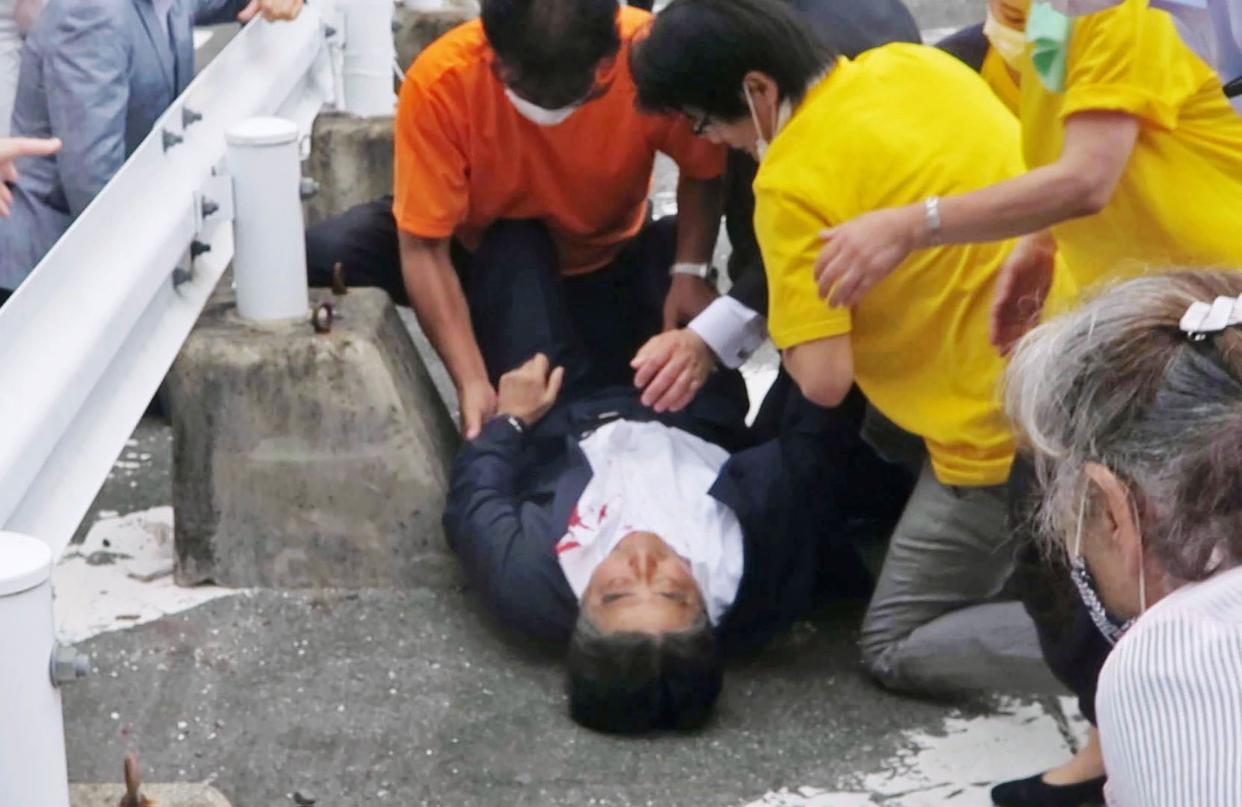
In this image from a video, Japan’s former Prime Minister Shinzo Abe, center, is attended on the ground in Nara, western Japan Friday, July 8, 2022.
Authorities said Yamagami claimed he carried out the shooting because he believed rumors about the former leader’s affiliation with a certain organization, which was not named. They also confiscated a firearm they said was clearly homemade and found another similar weapon during a search of his one-bedroom apartment.
Public broadcaster NHK also captured the violence on camera and has aired footage showing Abe, dressed in a blue suit and standing in front of a train station with his fist raised, right before he was shot. Additional footage sees him collapsed and bloodied in the street, with several security guards racing toward him. He was reportedly struck from behind.
Prime Minister Fumio Kishida, who belongs to the same political party as Abe, was traveling at the time by helicopter from his own campaign destination of Yamagata, in northern Japan. The nation’s leader immediately returned to Tokyo after the shooting, calling it “dastardly and barbaric.”
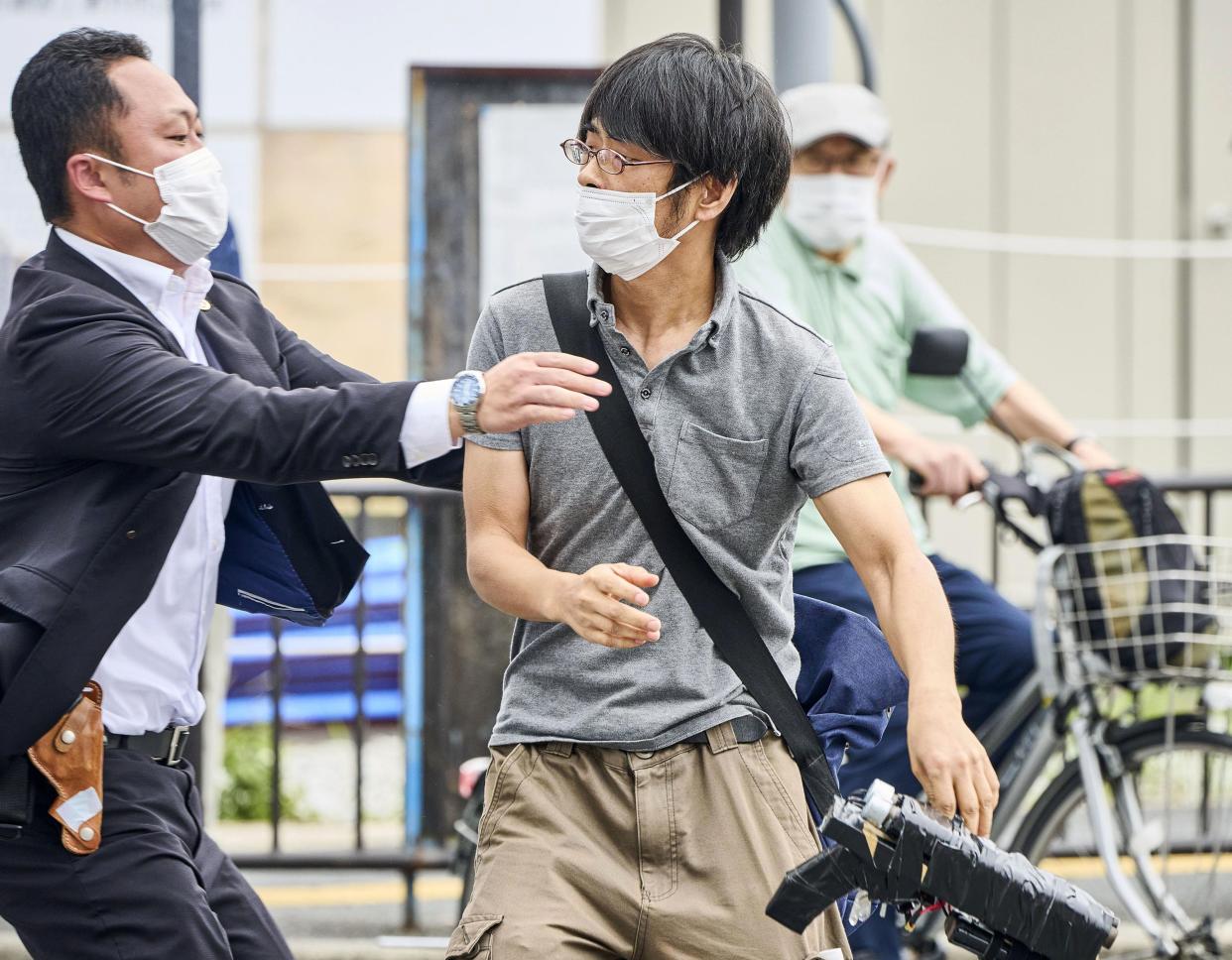
Tetsuya Yamagami, center, holding a weapon, is detained near the site of gunshots in Nara, western Japan Friday, July 8, 2022. Yamagami is accused of assassinating former Prime Minister Shinzo Abe by opening fire on at him from behind as he delivered a campaign speech.
He vowed Sunday’s parliamentary elections would continue as planned.
Kishida, struggling to hold back his emotions, said Abe “was a personal friend, with whom I spent a lot of time.”
“I use the harshest words to condemn (the act),” he added.
Political leaders and foreign officials around the world similarly decried the assassination.
“We are shocked and saddened to hear about the violent attack against former Japanese Prime Minister Shinzo Abe,” the White House said in a statement shortly afterward.
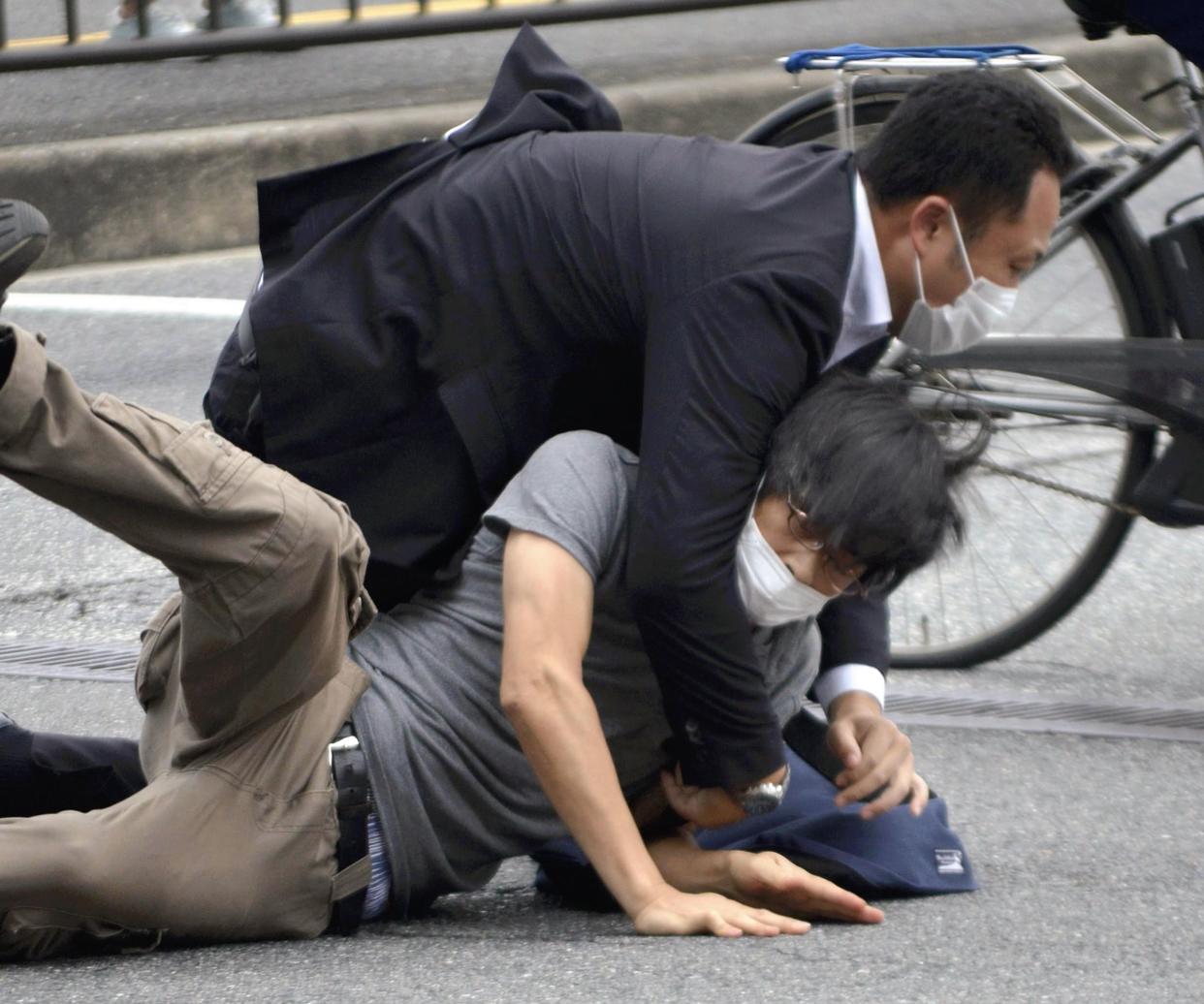
Tetsuya Yamagami, bottom, is detained near the site of gunshots in Nara Prefecture, western Japan, Friday, July 8, 2022. (Takashi Yamazaki/)
U.S. Secretary of State Antony Blinken, speaking with the Japanese and South Korean foreign ministers at a meeting in Bali, called Abe’s death “profoundly disturbing” and a “personal loss for so many people.
“For the United States, Prime Minister Abe was an extraordinary partner and someone who clearly was a great leader for Japan and the Japanese people,” Blinken said, adding that Abe, during his tenure, “brought the relationship between our countries — the United States and Japan — to new heights.”
South Korean President Yoon Suk Yeol called the shooting an “intolerable act” while Ukraine President Volodymyr Zelenskyy tweeted his “deepest condolences to his family and the people of Japan at this difficult time.”
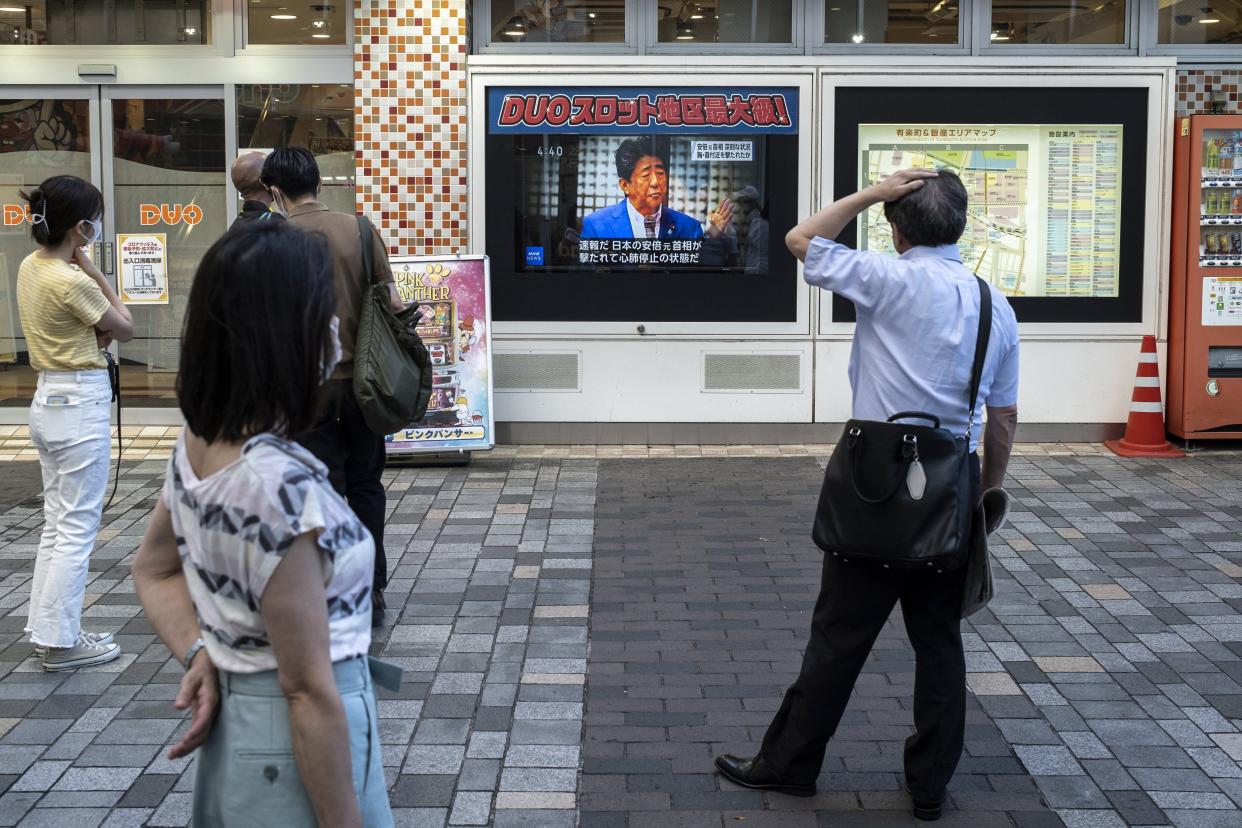
People look at a television broadcasting the news about the attack on former Japanese prime minister Shinzo Abe earlier in the day, along a street of Tokyo on July 8, 2022. (CHARLY TRIBALLEAU/)
Abe initially rose to prominence in national politics in the early 2000s. He became Japan’s youngest prime minister in 2006, at age 52, but abruptly resigned a year later amid a series of political scandals. His departure sparked what would later be dubbed a revolving door of politics, during which few long-term policies were established.
When he returned to office in 2012, Abe vowed to revitalize the nation, including with his economic policies later nicknamed “Abenomics.” The three-prong approach, intended to jumpstart the stagnant economy, called for a combination of monetary easing, increased government spending as well as other economic changes. He also strived to build Japan’s defense role and capability as well as its security alliance with the U.S.

A man prays in front of a makeshift memorial at the scene where the former Prime Minister Shinzo Abe was shot while delivering his speech to support the Liberal Democratic Party's candidate during an election campaign in Nara, western Japan, Friday, July 8, 2022. (Hiro Komae/)
Abe, the grandson of former Prime Minister Nobusuke Kishi, won a total of six national elections, firmly establishing himself as a political fixture and world leader. His father, Shintaro Abe, also served as chief cabinet secretary, which is often viewed as the nation’s second most powerful role.
By the time he resigned in 2020, citing medical issues, Abe had become modern Japan’s longest-serving prime minister. His tenure surpassed that of Kishi, who led Japan from 1957 to 1960.
With News Wire Services
